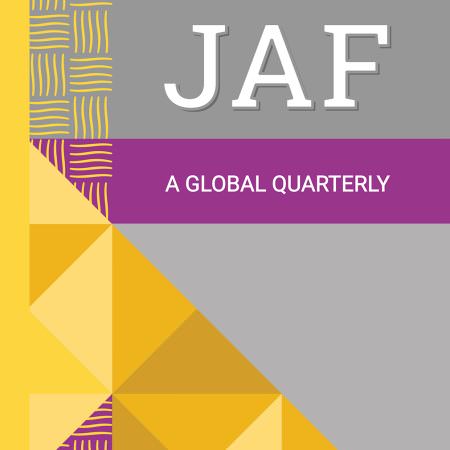JAF Articles Available for Free Through November 30

Four timely articles from the Journal of American Folklore (JAF: A Global Quarterly) are free to access through the end of this month to support conversations at the Annual Meeting of the American Folklore Society:
- “Safety in the Field: A Reflection and Progress Report” by Mathilde Frances Lind, has been made available for AFS Annual Meeting registrants to participate in this important ongoing conversation. Join Betty Belanus, Mathilde Lind, and Ann Ferrell online November 12 from 5:30 p.m. – 6:15 p.m. EST at the virtual Annual Meeting for Folklore Fieldwork and the Safety of Ethnographers II, a follow-up to their in-person session in Atlanta. The essay was originally published in Vol. 138, No. 549.
- In “This Needs More Time!: Considerations for Improving Partnerships Between Communities and Institutions in Folklore,” from Vol. 138, No. 549, author Sarah M. Gordon and Jasper Waugh-Quasebarth with Junious Lee Brickhouse, Ashley Minner Jones, and Naomi Sturm-Wijesinghe share insights from a series of panels at past AFS meetings. Their goal is to help institutions adapt their practices to better support community-engaged work.
- In “Cursed Russians and Armed Saints: ‘Angry Folklore’ and the Ethics of Precarity in Response to the 2022 Russian Invasion of Ukraine” from Vol. 138, No. 547, Robert Glenn Howard and Mariya Lesiv examine how folklore infused with rage and hostility (sometimes bordering on hate speech) raises ethical questions for researchers and audiences alike. The authors argue that such expressions must be understood in context, especially when they come from communities experiencing extreme physical precarity.
- The latest issue (Fall 2025, Vol. 138, No. 550) features “What to Wear When Saving Ukraine: Folkloric References and National Symbolism in Ukrainian Superhero Comics” by Jennifer A. Dickinson. This article explores how Ukrainian comic book heroes interact with the construction of a national identity, drawing on Ukrainian tradition and new narratives shaped by the ongoing conflict with Russia. These articles shed light on the evolving role of folklore in times of conflict and national transformation and resonate with this year’s conference theme, “Restoring and ReStorying: Missing Stories and Moving Forward.” As you engage with these readings, consider how folklore responds to crisis and how it helps communities reclaim and reshape their narratives.
Learn more about accessing the virtual portion of the Annual Meeting November 12 – 14.
We sometimes make mistakes, and we are happy to correct any errors that you may come across on our site. If you find an error, please let us know using the “submit a correction” link.